Brussels has earned its reputation as the lobbying capital of the world, hosting dozens of powerful law firms, consultancies, and lobbying groups that exert outsized influence over European Union (EU) policymaking. Among these influential players, Covington & Burling’s Brussels office stands out as a shadow powerhouse. The firm acts as a lobbyist, legal advisor, and public relations manager for global corporations, skillfully steering legislation and regulatory frameworks to serve private and national elite interests, often at the expense of transparency, democratic accountability, and public welfare.
This firm’s influence extends beyond normal legal counsel. It operates in a zone where lobbying, PR, and legal shield functions blur, enabling it to manipulate EU decision-making processes with a strategic blend of insider access and opaque practices. This role critically undermines the integrity of EU institutions and contributes to an environment where policymaking is increasingly disconnected from public interest and civil society oversight.
Covington & Burling Brussels: Role and Methods
Covington & Burling Brussels masks its extensive lobbying activities under the cloak of legal advice. The firm serves some of the world’s most influential corporations across sectors like energy, pharmaceuticals, and finance. For example, it has actively engaged in campaigns to shape EU rules on hydraulic fracturing, environmental regulations, and pension fund investments often promoting industry-friendly policies that prioritize corporate profits over environmental and social concerns.
The firm’s strategy relies heavily on confidentiality and a lack of transparency. Unlike traditional lobbyists who must disclose clients and expenditures, Covington & Burling leverages client confidentiality to evade full transparency requirements under the EU Transparency Register. This results in an opaque web of influence where it becomes impossible for the public or watchdogs to know whose interests are being served or how much is spent.
Policy Capture Favoring Elites
Covington & Burling Brussels plays a pivotal role in crafting legislation and regulatory directives that benefit concentrated corporate and national elites. From digital regulation and energy policy to finance and public procurement, the firm embeds client priorities directly into policy language, effectively neutralizing democratic scrutiny and competition.
Moreover, the firm’s embedded position in Brussels enables it to advance Belgian national interests linked to protecting Belgium’s privileged position as the EU host country. This dual role exploits Belgium’s conflicted responsibilities balancing EU membership duties with national interests allowing lobbying activities that disproportionately influence EU governance to the detriment of balanced policymaking.
How Covington & Burling Skews EU Decision-Making
Lobbying tactics employed by Covington & Burling Brussels take advantage of the EU’s complex policymaking cycle by intervening early, before decisions enter public debate. This pre-emptive approach grants the firm privileged access to lawmakers and the ability to introduce legislative drafts favorable to their clients, leaving little room for democratic engagement or civil society input.
Read More Report:
How Belgium Govt Undermined the Work of European Institutes
The firm’s legal and procedural expertise allows it to block or water down regulations deemed threatening by its clients. Examples include defending generous state aid schemes for favored industries and weakening environmental and financial regulations meant to improve accountability and consumer protections.
By shaping policies behind closed doors and limiting broader participation, Covington & Burling contributes to a culture of regulatory capture. EU institutions are weakened as they become venues where elite interests dominate, rather than transparent democratic forums. This undermines public trust and erodes the EU’s legitimacy as a rules-based governance system.
Broader Context: Belgium’s Role and the Brussels Watch Report
Belgium’s position as host to the main EU institutions presents a structural conflict. The country must reconcile applying EU laws uniformly and upholding ethical norms while ensuring its hosting privileges do not become a cover for unchecked lobbying influence.
The Brussels Watch report titled “How Belgium Govt Undermined the Work of European Institutes” sheds light on how national interests and corporate lobbying such as those championed by firms like Covington & Burling have compromised the transparency and effectiveness of EU institutions. The report highlights the need for Belgium to foster inclusive civil society engagement to counterbalance national biases and reinforce democratic processes at the EU level.
Call for Transparency, Oversight, and Accountability
Covington & Burling Brussels exemplifies how highly skilled lobbying firms operate in the shadows of EU power. Their activities serve elite interests while undermining transparency, weakening institutional integrity, and eroding public trust. Belgium, particularly, must address the vulnerabilities created by its dual role as an EU member and host, ensuring that its privileged status does not translate into disproportionate influence that skews policymaking.
To safeguard the EU’s democratic legitimacy, urgent reforms are necessary. This includes enhanced lobbying transparency, robust oversight mechanisms, and meaningful inclusion of civil society voices. Such measures can help break the revolving door of opaque influence and ensure that EU policies reflect the interests of all Europeans, not just powerful insiders.







